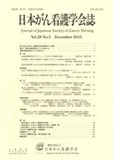Japanese
English
- 販売していません
- Abstract 文献概要
- 参考文献 Reference
要旨
本研究は,造血器腫瘍患者のギアチェンジを支える看護師の構えを明らかにし,看護の示唆を得ることを目的とした.がん看護領域で5年以上,造血器腫瘍患者のケアに携わった3年以上の臨床経験のある看護師9名を対象に半構成的面接を行い,データを質的帰納的に分析した.
その結果,造血器腫瘍患者のギアチェンジを支える看護師の構えにおける認識として,【患者・家族が生死と向き合う有り様】【患者・家族の悲愴な思いの存在】【患者を混迷させる緩和治療】【家族の存在意義】【患者・看護師関係の重要性】【望ましい最期の実現に向けた決意】【ギアチェンジを支えられないもどかしさ】,行動として,【人生の岐路に関わる覚悟を固める】【生き方の決断過程にタイミングよく働きかける】【ギアチェンジに向き合う力を引き出す】【その人らしい生き方を支える】【その人らしく生きる策を医療者で探索する】【パートナーシップを築く】【ギアチェンジを支える準備性を高める】のそれぞれ7の大カテゴリーが抽出された.
看護師は,ギアチェンジ期の造血器腫瘍患者の状況を掴み,その状況を踏まえて生じた看護師の肯定的な考えと否定的な感情を原動力として,患者の人生の岐路に関わる覚悟を固め,患者自身が生き方を決断できるように,患者の力の発揮を促したり患者の力を発揮しやすい環境を整えたりして,ギアチェンジを支えると考えられた.
The purpose of this study was to understand the attitudes of nurses regarding supporting changing gears in hematopoietic tumor patients, and to obtain insights into this aspect of nursing. The participants were nine nurses with five or more years of cancer nursing experience and three or more years of clinical experience in caring for hematopoietic tumor patients. Semi-structured interviews were conducted, and interview contents were qualitatively and inductively analyzed.
The following seven main categories were recognized as points of awareness in nurses' attitudes toward changing gears in hematopoietic tumor patients: “the state of patients and their families who face life and death,” “the existence of sorrow among patients and families,” “palliative treatment being confusing to patients,” “the significance of the existence of family,” “the importance of the patient-nurse relationship,” “determination toward the realization of a desirable end,” and “irritation from not being able to support changing gears.” With respect to behavior, the following seven main categories were recognized: “solidifying determination to get involved at the end of a patient's life,” “encouraging decision-making processes and making good use of time,” “summoning the strength to face changing gears,” “supporting the patient's way of life,” “healthcare professionals finding a way for the patient to live life their own way,” “developing partnerships,” and “enhancing the readiness to support changing gears.”
Nurses were able to understand the state of hematopoietic tumor patients who were in the midst of changing gears, and used the optimism and negative emotions gained from their understanding as a driving force to become more involved in the patients' crossroads of life. Along with these efforts aimed at allowing patients to decide their own way of life, nurses provided an encouraging enviroment where patients could exert their power. These efforts led to the support of changing gears.
Copyright © 2015, Japanese Society of Cancer Nursing All rights reserved.


